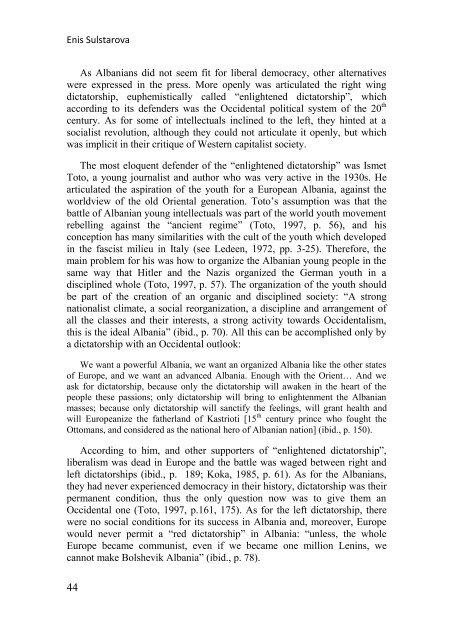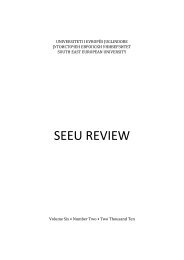SEEU Review vol. 5 Nr. 2 (pdf) - South East European University
SEEU Review vol. 5 Nr. 2 (pdf) - South East European University
SEEU Review vol. 5 Nr. 2 (pdf) - South East European University
You also want an ePaper? Increase the reach of your titles
YUMPU automatically turns print PDFs into web optimized ePapers that Google loves.
Enis Sulstarova<br />
As Albanians did not seem fit for liberal democracy, other alternatives<br />
were expressed in the press. More openly was articulated the right wing<br />
dictatorship, euphemistically called “enlightened dictatorship”, which<br />
according to its defenders was the Occidental political system of the 20 th<br />
century. As for some of intellectuals inclined to the left, they hinted at a<br />
socialist re<strong>vol</strong>ution, although they could not articulate it openly, but which<br />
was implicit in their critique of Western capitalist society.<br />
The most eloquent defender of the “enlightened dictatorship” was Ismet<br />
Toto, a young journalist and author who was very active in the 1930s. He<br />
articulated the aspiration of the youth for a <strong>European</strong> Albania, against the<br />
worldview of the old Oriental generation. Toto’s assumption was that the<br />
battle of Albanian young intellectuals was part of the world youth movement<br />
rebelling against the “ancient regime” (Toto, 1997, p. 56), and his<br />
conception has many similarities with the cult of the youth which developed<br />
in the fascist milieu in Italy (see Ledeen, 1972, pp. 3-25). Therefore, the<br />
main problem for his was how to organize the Albanian young people in the<br />
same way that Hitler and the Nazis organized the German youth in a<br />
disciplined whole (Toto, 1997, p. 57). The organization of the youth should<br />
be part of the creation of an organic and disciplined society: “A strong<br />
nationalist climate, a social reorganization, a discipline and arrangement of<br />
all the classes and their interests, a strong activity towards Occidentalism,<br />
this is the ideal Albania” (ibid., p. 70). All this can be accomplished only by<br />
a dictatorship with an Occidental outlook:<br />
We want a powerful Albania, we want an organized Albania like the other states<br />
of Europe, and we want an advanced Albania. Enough with the Orient… And we<br />
ask for dictatorship, because only the dictatorship will awaken in the heart of the<br />
people these passions; only dictatorship will bring to enlightenment the Albanian<br />
masses; because only dictatorship will sanctify the feelings, will grant health and<br />
will <strong>European</strong>ize the fatherland of Kastrioti [15 th century prince who fought the<br />
Ottomans, and considered as the national hero of Albanian nation] (ibid., p. 150).<br />
According to him, and other supporters of “enlightened dictatorship”,<br />
liberalism was dead in Europe and the battle was waged between right and<br />
left dictatorships (ibid., p. 189; Koka, 1985, p. 61). As for the Albanians,<br />
they had never experienced democracy in their history, dictatorship was their<br />
permanent condition, thus the only question now was to give them an<br />
Occidental one (Toto, 1997, p.161, 175). As for the left dictatorship, there<br />
were no social conditions for its success in Albania and, moreover, Europe<br />
would never permit a “red dictatorship” in Albania: “unless, the whole<br />
Europe became communist, even if we became one million Lenins, we<br />
cannot make Bolshevik Albania” (ibid., p. 78).<br />
44

















